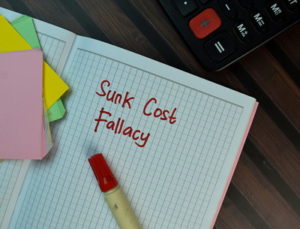 Imagine getting in your car with the intention of driving to the supermarket that is twenty minutes from where you live. Halfway there, you remember that it is not open on weekends, but instead of turning back you continue your journey ‘just to make sure’. After all, you’ve already been driving for ten minutes so you might as well do another ten on the off chance that you were wrong and the supermarket is actually open on a Saturday.
Imagine getting in your car with the intention of driving to the supermarket that is twenty minutes from where you live. Halfway there, you remember that it is not open on weekends, but instead of turning back you continue your journey ‘just to make sure’. After all, you’ve already been driving for ten minutes so you might as well do another ten on the off chance that you were wrong and the supermarket is actually open on a Saturday.
Known by the British saying of ‘throwing good money after bad’, this way of thinking is common and is an illogical cognitive pattern that is widespread, especially when it comes to gambling. It is the idea that you’ve already paid something so you might as well keep going in the hope that you’ll be able to recoup your initial investment. Logically you know you should stop, just as you know the supermarket is shut, but you keep going anyway.
The Sunk Cost Fallacy Explained

In economic terms, a ‘sunk cost’ is a cost that has already been paid and therefore cannot be recovered. It is the opposite of a prospective cost, which is a cost in the future that can be avoided if you do something about it. Sunk costs are, in essence, prices that have already been paid that shouldn’t have any bearing on our current decision making. The reality is, however, people often think about previous expenditures when making decisions.
In theory, people should not allow sunk costs to play a part in their decision making about current options. Things that have already happened should be treated as water under the bridge, forgotten about and allowed to be consigned to the dustbin of history. In practice, though, people often find themselves ‘crying over spilt milk’ when trying to make a decision in the present moment, stopping them from being rational.
People will often convince themselves that a previous expenditure means that further investments are justified. If an investment in time, effort or money has been made then many people are likely to continue on the same endeavour, even after it’s become clear that it is a bad investment. This can be seen in countless different real-world situations, such as a bad relationship continuing because of the time already invested.
You can also see it in political decision making, such as politicians refusing to end a war because of the idea that the lives lost until that point would have ‘been for nothing’ if victory is not achieved. On a grand scale, the fallacy can be seen in play in the Concorde project between the British and French governments. Even once the supersonic jet had been proven to be a commercial disaster, both governments continued to fund it.
Suffering More Than Once
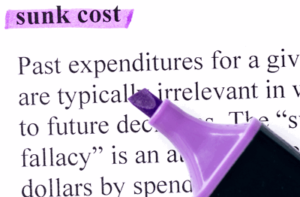 The reality of people continuing to invest money, time or effort into something even after it is no longer enjoyable is that they force themselves to suffer twice. Imagine a family that has paid to go a theme park for the day. Once they’re there, it becomes abundantly clear that no one in the family is enjoying themselves and all are actually actively unhappy with what they’ve chosen to do with their day. They are faced with two choices:
The reality of people continuing to invest money, time or effort into something even after it is no longer enjoyable is that they force themselves to suffer twice. Imagine a family that has paid to go a theme park for the day. Once they’re there, it becomes abundantly clear that no one in the family is enjoying themselves and all are actually actively unhappy with what they’ve chosen to do with their day. They are faced with two choices:
- Accept that they aren’t enjoying it but continue to spend the day at the theme park because of how much they spent to get there
- Accept that they aren’t enjoying it and so head home or go to do something else with the remained of their day
The logical thing for the family to do would be to cut their losses and head home or elsewhere and try to get some enjoyment out of the remainder of the day. However, because so much money has been invested in getting to the theme park in the first place, most families will decide to stay at the theme park for the remainder of the day in order to try to ‘get their money’s worth’.
This attitude results in the family suffering twice: once when the paid the money to get to the theme park in the first place and then again when they are actually at the theme park and stay there despite not enjoying themselves. It is better to suffer only once, given that the trip to the theme park has already been paid for and that expense cannot be recouped no matter what the family does in the theme park in the afternoon.
It is an entirely irrational way of thinking, but most people feel as though they don’t want to ‘waste’ the money that they’ve spent, in spite of the fact that they’ve already spent it. The information regarding the money spent is irrelevant and not worth taking into account because it’s already gone, yet the vast majority of people will always take it into account when trying to decide what to do next with their time, effort and money.
How It Relates To Gambling
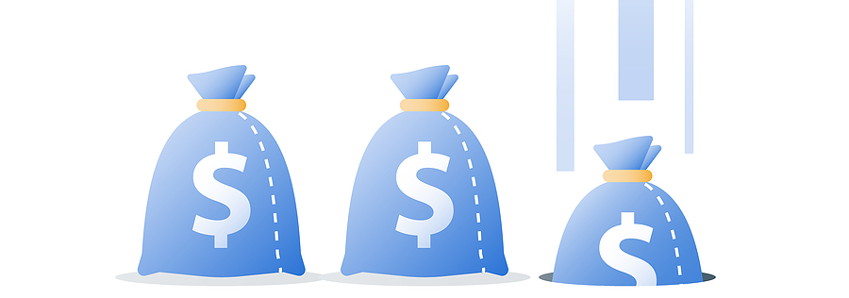
Understanding what the sunk cost fallacy is is one thing, but understanding how it relates to gambling is the key thing to get your head around. In the world of behavioural economics there are five main psychological factors that underpin the sunk cost fallacy, which are as follows:
- Loss Aversion
- Framing Effects
- Overoptimistic Probability Bias
- Personal Responsibility
- Desire Not To Be Wasteful
These are all things that apply to gamblers who find themselves ‘throwing good money after bad’, so we’ll look at them all a little bit more closely here.
Loss Aversion
People don’t like ‘wasting’ their resources, which makes complete sense. The money spent up until the point that someone has to make a decision about what to do next should really be completely irrelevant to decision making, but in reality people don’t want to feel as though they’ve ‘lost’ their money on something and so try to add a sense of ‘usefulness’ to the situation at hand.
Framing Effects
This is a cognitive bias involving people deciding on the best option available to them according to whether the options available are presented with a positive or negative connotation. In other words, rather than seeing cutting their losses as a gain, people consider it be a further loss and don’t like this perceived bias. As a result they take the ‘positive’ framing of trying to ‘win’ money rather than the negative one of accepting a ‘loss’.
Overoptimistic Probability Bias
Simply put, this is when someone makes an investment and that mentally increases the likelihood of them seeing a return on said investment. This can be seen most clearly in people placing a bet and then convincing themselves that the bet that they’ve placed is going to be a winner, as opposed to those just about to place a bet believing that it has a fair chance of winning.
Personal Responsibility
Bettors have a personal responsibility for the bets that they’ve placed, which often increases the likelihood that they’ll make another investment even if they first one went wrong. In a study of business students, those that were told that a previous hypothetical investment that they’d made had gone wrong went on to invest more money than those that were told that a previous manager had made a poor investment. In other words, the thinking was essentially ‘it was my fault so I’ve got to fix it’.
Desire Not To Be Wasteful
This is like the family that have gone to the amusement park and are not enjoying the day. They don’t want to ‘waste’ their investment so they keep going rather than calling it quits. Equally, gamblers who have lost a bet don’t want to ‘waste’ the money that they’ve already invested so they keep gambling even when they know it’s not the right thing to do or when it has become clear that they’re losing money.
Loss Aversion Is The Chief Predecessor To The Sunk Cost Fallacy
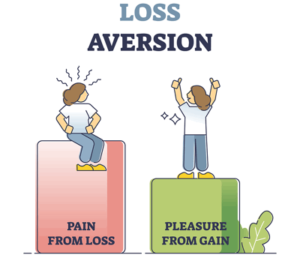 Meet Henry Gribbohm, a 30-year-old resident of Epson, New Hampshire, attended a carnival and was presented with the opportunity to win an Xbox Kinect for the small price of just $3. All he needed to do was toss a ball into a tub and win a prize, though he didn’t know what the prize was going to be each time he tossed the ball. Unfortunately for Gribbohm, the balls soon started bouncing out of the tub.
Meet Henry Gribbohm, a 30-year-old resident of Epson, New Hampshire, attended a carnival and was presented with the opportunity to win an Xbox Kinect for the small price of just $3. All he needed to do was toss a ball into a tub and win a prize, though he didn’t know what the prize was going to be each time he tossed the ball. Unfortunately for Gribbohm, the balls soon started bouncing out of the tub.
Rather than cut his losses and walk away $3 worse off, he sank $300 trying to ‘win his money back’. He opted for a ‘double or nothing’ strategy and continually came up with nothing. He sank more and more money into the chase for an Xbox Kinect, eventually spending a reported $2,600, all of which he had to show for it at the end of his time at the carnival was a fluffy banana with Rastafarian hair.
Gribbohm’s desire to not lose money is what resulted in him falling foul go the sunk cost fallacy, continually believing that he’d be able to win his money back or, at the very least, walk away with an Xbox Kinect. For Xbox Kinect read any prize that you might wish to win at a casino or courtesy of a bookmaker. Most punters are just as liable to being averse to losses as Gribbohm and therefore losing more money than they need to.
Avoiding The Sunk Cost Fallacy
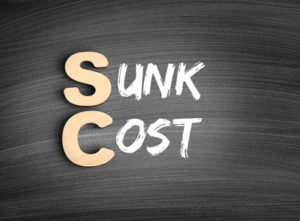 Now we know all about the sunk cost fallacy, it’s important to try to figure out what we do to avoid falling into its trap. Loss aversion is a powerful thing because it weighs losses more heavily than gains. One way to avoid allowing it to have power over your betting is by quantifying the real loss that you’re suffering, rather than the imagined one. Is losing £20 on a bad bet really all that bad in the grand scheme of things?
Now we know all about the sunk cost fallacy, it’s important to try to figure out what we do to avoid falling into its trap. Loss aversion is a powerful thing because it weighs losses more heavily than gains. One way to avoid allowing it to have power over your betting is by quantifying the real loss that you’re suffering, rather than the imagined one. Is losing £20 on a bad bet really all that bad in the grand scheme of things?
It’s important to think ahead, not in the past. As Shankar Vedantam puts it, making decisions from the position of someone that is loss averse is akin to trying to drive your car by always looking in the rearview mirror. You wouldn’t drive your car by looking backwards so it’s sensible to avoid doing so when making other decisions. The money that you’ve lost is gone, you can’t bet sensibly whilst thinking about trying to win it back.
Knowing that you’re at risk of falling for the sunk cost fallacy is the first step in figuring out how to beat it. What you’ll want to think about is where you’re heading and where you want to be. If you take a pause in your betting and realise that you’re chasing your losses rather than thinking about your future wins, you should use the opportunity to cut your losses and walk away from the table. You need to re-frame how you’re thinking about your gambling.
Think of it another way in your own head. Don’t think ‘I’m trying to win back the £20 I lost’, but instead think ‘I’m winning the £100 I would spend chasing my losses’. You don’t need to be loss averse as you’re not losing anything, instead you’re gaining the money that you’d throw away trying to win a relatively small amount back. Don’t get caught in the spiral of throwing your good money after money that is already gone.
Make sure that you’re away when you begin thinking any of the following phrases:
- My luck will turn
- If I double my stakes with each loss I’ll win it all back eventually
- Increasing my stake will see me win more
You’re far better placed starting each bet with a clean sheet than in thinking about past mistakes. Remove the link in your head between the money that you’ve lost already and the bets you’re about to place. Is the bet you’re thinking about a sensible one, when you evaluate it independently? If not, don’t place it and walk away with the money still in your pocket, rather than making a bad bet to recoup money you’ve already lost.
